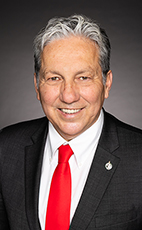44th Parl. 1st Sess.
February 26, 2024 11:00AM
- Feb/26/24 3:15:14 p.m.
- Watch
Mr. Speaker, investments in infrastructure like roads, highways and bridges are crucial for our supply chains, local economies and traditional industries, commuters and all Canadians.
Last week, our government, along with the Province of Prince Edward Island, invested over $21 million to improve local roads, benefiting islanders and building on significant infrastructure investments.
Could the Minister of Housing, Infrastructure and Communities share with the House the government's policy on projects like this and how they benefit rural communities?
79 words
- Hear!
- Rabble!
- add
- star_border
- share
- Feb/26/24 3:15:50 p.m.
- Watch
Mr. Speaker, I want to thank my hon. colleague for his advocacy to get roads built in his community.
This announcement, worth more than $21 million, is going to help build or improve 149 kilometres of road on the island. We continue to fund different road supports across programs, whether it is the Canada community-building fund, the disaster mitigation and adaptation fund, the national trade corridors fund or the investing in Canada infrastructure plan, which included specifically eligibility for rural roads.
We have programs in Calgary, in my own constituency in Nova Scotia and on the island. We are going to keep doing what it takes to put people to work in good-paying jobs that build communities.
119 words
- Hear!
- Rabble!
- add
- star_border
- share
- Feb/26/24 3:16:31 p.m.
- Watch
Mr. Speaker, Canadians across the country are struggling with the rising cost of food, and it is even worse in northern and indigenous communities, where the lack of competition has allowed NorthMart, often the only option, to jack up the cost of food without consequence.
The Liberals are choosing to stand with wealthy CEOs instead of helping families afford food. In addition to competition, first nations like Garden Hill need reliable all-weather roads to be able to bring in food and supplies.
When will the Liberals stop subsidizing CEO profits, take on the grocery giants and stand up for northerners?
101 words
- Hear!
- Rabble!
- add
- star_border
- share
- Feb/26/24 3:17:10 p.m.
- Watch
Mr. Speaker, we are working with provincial governments, territorial governments, indigenous governments and communities in the north to address the very real challenges that are in the north: isolation, lack of infrastructure, the high price of food and the high price of absolutely everything.
With the partnerships we have, I am confident that progress is being made, but there is so much more to do, and we will get it done.
71 words
- Hear!
- Rabble!
- add
- star_border
- share
- Feb/26/24 3:17:41 p.m.
- Watch
I have a statement I would like to make.
The Chair would like to take a few minutes to share with the House some brief reflections on our proceedings since the resumption of the session at the end of January. This is quite relevant today.
Since my election as your Speaker, I have made it my main goal to work toward improving the decorum of this place. I have received feedback and support from whips, which led to some improvements. I am grateful for their efforts.
In my observations, I have also noticed the vast majority of exchanges during the sitting day are productive and are worthy of our institution, and for this, I express my gratitude to all as it is incumbent on all of us to elevate the quality of our proceedings. That being said, there has been a slow but steady increase in language and expressions that have been perceived to be inflammatory. The Chair wishes to address this as we move toward the spring session.
169 words
- Hear!
- Rabble!
- add
- star_border
- share
- Feb/26/24 3:20:06 p.m.
- Watch
During key moments, remarks have, at times, gotten too close to the limit of what is considered respectful and courteous, or even in good taste. Other interventions have clearly crossed the line of unparliamentary language. As a result, proceedings were often interrupted by a Chair's interventions or by points of order generated by the conduct of members from all sides of the House.
In some cases, the use of certain expressions or language was determined by the Chair to be unparliamentary and resulted in the withdrawal of the offending term or an apology from the member. In those instances, the Chair considered the matter closed and we moved on. There are other times when the Chair has issued warnings, encouraging members to stay away from certain terms. While not finding them unparliamentary, they do contribute to disorder and we would all be best served by avoiding this sort of language.
On other occasions, the Chair has ruled that something was considered “a matter of debate”. When a Chair rules that a particular statement is a matter of debate, the Chair is saying that there is a debatable point in the balance as opposed to a personal attack, the use of an easily identifiable unparliamentary term or an exchange that results in disorder. Insofar as debate can, on occasion, be sharp and tense, even sometimes causing some members to take offence, it can still fall within the realm of an acceptable discourse in the House. The Chair will continue to make these distinctions when necessary.
Even when there was no finding of the actions or language in question being unparliamentary in a strict sense, it is evident to the Chair and to those watching our debates that the accumulation of this sort of behaviour has had a negative lingering effect on our proceedings. Since January, the Chair has heard statements that were excessively provocative and insulting.
These sorts of comments have proven to be disruptive to our proceedings, hurtful to members, detrimental to moving our work forward, and beneath the high office we hold as members of parliament.
On December 12, 2012, one of my predecessors had observed, at page 13,215 of Debates:
The House is also an inherently adversarial forum that tends to foster conflict. As a result, sometimes emotions get the better of us and we quickly find ourselves in situations marked by disorderly conduct. Tone and gestures can cause as much of a reaction as the words used in debate. Lately, it appears that at different times the mood of the House has strayed quite far from the flexibility, accommodation and balance that ideally ought to exist in this place.
Regardless of whether the Chair finds language unparliamentary, it is incumbent upon all members to judiciously consider their remarks. As I stated on October 18, 2023, at page 17584 of the Debates, and I quote:
The House is a place where freedom of speech is primordial and where views are strongly held and vigorously defended. While the Chair must allow the widest possible range of individual expression possible, members are expected to be mindful of their words and behaviours within the realm of what would be considered parliamentary.
The Chair, and by this I mean myself and my fellow presiding officers, therefore, encourages all members to take part in our proceedings, even vigorously and passionately, as the case may be, but to do so in a civilized and respectful manner in accordance with our own rules.
The Chair will continue applying the rules, fairly and forcefully when required, but in the end, it is every member's responsibility to exercise a reasonable degree of self-discipline and restraint while exercising their privilege of freedom of speech.
I thank all members for their attention and for their continued efforts in improving decorum in the House.
640 words
- Hear!
- Rabble!
- add
- star_border
- share
- Feb/26/24 3:26:12 p.m.
- Watch
I am also now prepared to rule on the question of privilege raised on February 8, by the member for Regina—Lewvan concerning allegedly misleading statements made in the House by the Prime Minister and the Minister of Environment and Climate Change.
In raising his question of privilege, the member alleged that the Prime Minister and the Minister of Environment and Climate Change had misled the House during Oral Questions on February 7 and 8, when they implied that he said there is no link between the carbon tax and food prices. The member quoted one of the statements he made in the House on February 6, to assert that, in fact, he had made such a link. In the member's view, this misrepresentation rose to the level of a prima facie question of privilege.
The question of privilege the Chair is being asked to rule on can be summarized as follows: determining whether the statements of the Prime Minister and the minister contain inaccuracies that would show that they knowingly misled the House.
When the member raised his question of privilege in the House, he rightly referred to the three conditions that must be met for the Chair to find a prima facie case of privilege. In my ruling of February 15, 2024, I laid out those three conditions. I would encourage members to review that ruling.
In a similar situation, one of my predecessors said, in a ruling on April 30, 2014, which can be found on page 4,753 of Debates:
Thus, it is not sufficient for members to simply make allegations based on their perceptions of what is or is not factually correct. Members must recognize and accept the existence of differences of fact and interpretation, which have always been a part of the normal cut and thrust of debate and question period.
As for the question of privilege before us, I reviewed the statements of the Prime Minister and the Minister of Environment and Climate Change during oral questions on February 7 and 8, 2024. The Chair could not find in those statements any grounds to conclude that those members knew their answers were misleading or that they intended to mislead the House.
The member for Regina—Lewvan was able to correct the record by explaining his intent and his point of view. In my opinion, we are therefore dealing with a matter of debate. Consequently, the Chair cannot find a prima facie case of privilege here.
I thank all members for their attention.
424 words
- Hear!
- Rabble!
- add
- star_border
- share
moved for leave to introduce Bill C-63, An Act to enact the online harms act, to amend the Criminal Code, the Canadian Human Rights Act and an act respecting the mandatory reporting of Internet child pornography by persons who provide an Internet service, and to make consequential and related amendments to other acts.
54 words
- Hear!
- Rabble!
- add
- star_border
- share
- Feb/26/24 3:29:20 p.m.
- Watch
Mr. Speaker, pursuant to Standing Orders 104 and 114, I have the honour to present, in both official languages, the 60th report of the Standing Committee on Procedure and House Affairs regarding the membership of committees of the House.
If the House gives its consent, I intend to move concurrence in the 60th report later this day.
57 words
- Hear!
- Rabble!
- add
- star_border
- share
- Feb/26/24 3:29:43 p.m.
- Watch
Mr. Speaker, I have the honour to present, in both official languages, the 14th report of the Standing Committee on Government Operations and Estimates, also known as the mighty OGGO, in relation to the motion adopted on Wednesday, February 21, regarding a question of privilege.
If the House gives its consent, I intend to move concurrence in this report later this day.
62 words
- Hear!
- Rabble!
- add
- star_border
- share
- Feb/26/24 3:30:17 p.m.
- Watch
Mr. Speaker, I have the honour to present, in both official languages, the 16th report of the Standing Committee on Finance, entitled “Shaping our Economic Future: Canadian Priorities”.
I want to thank the finance committee clerk, Alexandre Roger; the analysts, Joëlle Malo, Michaël Lambert-Racine; Brett Capwell and Mehrab Kiarsi; the committee assistant, Lynda Gaudreault; the whole team of interpreters, technologists and staff of the committee; and, of course, all the members of the committee, witnesses and department officials for their hard work in completing this report.
93 words
- Hear!
- Rabble!
- add
- star_border
- share
- Feb/26/24 3:30:48 p.m.
- Watch
Mr. Speaker, Conservatives are presenting a dissenting report. The committee report does not recommend reducing the out-of-control deficit spending by the Liberal-NDP government, which has driven up inflation and interest rates. It does not address Canada's GDP, which has been declining since September 2022 and is lower than it was in 2018. It also does not recommend axing the carbon tax scam or reversing any of the Liberals' other tax increases.
Canadians are in a cost of living crisis and are getting poorer. After eight years of the Liberal-NDP government, the Liberal Prime Minister is not worth the cost. Common-sense Conservatives will axe the tax, build the homes, fix the budget and stop the crime.
We would like to thank the committee staff, clerk, analysts and witnesses for their work on the pre-budget consultations.
141 words
- Hear!
- Rabble!
- add
- star_border
- share
- Feb/26/24 3:31:38 p.m.
- Watch
Mr. Speaker, I have the honour to present, in both official languages, the three following reports of the Standing Committee on National Defence: the eighth report, entitled “Increase in Rental Housing Costs for Canadian Military Personnel”, in relation to a motion adopted Wednesday, February 7; the ninth report, entitled “Donation of Surplus CRV7 Rockets to Ukraine”, also in relation to a motion adopted on February 7; and, finally, the tenth report, entitled “On the Frontlines of Democracy: Canada and the North Atlantic Treaty Organization Responding to Russia’s Aggression in Europe”.
The last report takes note that we are two days past the recognition of the Ukrainian war on February 24. There is nothing like going there to see the contributions of Canadians to this war effort and to the other allies. I recommend that report, in particular, for the reading of my colleagues.
151 words
- Hear!
- Rabble!
- add
- star_border
- share
moved that Bill S-13, An Act to amend the Interpretation Act and to make related amendments to other Acts be now read the first time and printed.
28 words
- Hear!
- Rabble!
- add
- star_border
- share
- Feb/26/24 3:33:33 p.m.
- Watch
Mr. Speaker, it is always a pleasure to rise on behalf of the good people of Waterloo; I would also just note that the procedure and House affairs committee is on its 60th report.
If the House gives its consent, I move that the 60th report of the Standing Committee on Procedure and House Affairs, presented to the House earlier today, be concurred in.
64 words
- Hear!
- Rabble!
- add
- star_border
- share
- Feb/26/24 3:33:51 p.m.
- Watch
All those opposed to the hon. member's moving the motion will please say nay.
It is agreed.
The House has heard the terms of the motion. All those opposed to the motion will please say nay.
37 words
- Hear!
- Rabble!
- add
- star_border
- share
- Feb/26/24 3:34:14 p.m.
- Watch
Mr. Speaker, I note that all parties to the government operations and estimates committee have agreed to this motion so we can get to the bottom of the ArriveCAN scandal. Therefore, I ask that the House gives its consent. I move that the 14th report of the Standing Committee on Government Operations and Estimates, presented earlier in the day, be concurred in.
62 words
- Hear!
- Rabble!
- add
- star_border
- share
- Feb/26/24 3:34:36 p.m.
- Watch
Is there consent?
Some hon. members: Nay.
7 words
- Hear!
- Rabble!
- add
- star_border
- share
- Feb/26/24 3:35:22 p.m.
- Watch
Madam Speaker, I have a number of petitions to present to the House today.
The first petition is in support of parents being able to make decisions about their own families without the interference of the federal government. The petitioners call attention to how the Liberal government is trying to involve itself in decisions that should properly be made by parents and by provinces. These petitioners particularly reference the policy in New Brunswick of having parental consent involved in the changing of names and pronouns for students under 16.
The petitioners note that, in the vast majority of cases, parents care about the well-being of their children and love them much more than any state-run institutions do. They note that the role of government is to support families and respect parents, not dictate how they should make decisions for their children. The petitioners therefore call on the Government of Canada to butt out and let parents raise their own children.
162 words
- Hear!
- Rabble!
- add
- star_border
- share
Madam Speaker, the next petition is in support of a private member's bill, Bill C-257, which would add political belief and activity as prohibited grounds of discrimination to the Canadian Human Rights Act.
The petitioners note that Canadians should be free from political discrimination. This reflects a broad opposition to Canadians facing arbitrary discrimination; protection from political discrimination also ensures that Canadians will be able to express themselves on important issues of the day without fear of employment or other reprisals. Therefore, the petitioners call on the House to support Bill C-257.
95 words
- Hear!
- Rabble!
- add
- star_border
- share













